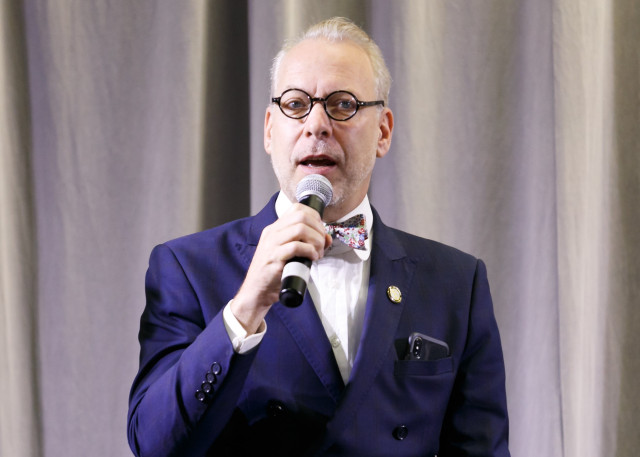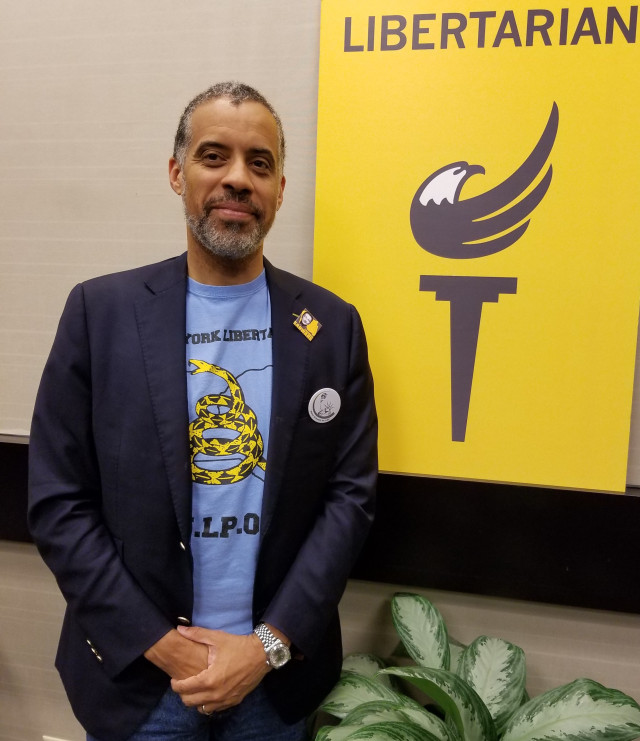Adam Kokesh has a flair for the dramatic, which tends to get him in trouble—usually by design. In 2011, the stocky Marine-turned-antiwar activist from Ash Fork, Arizona, was forcefully arrested at a silent dance protest at the Jefferson Memorial. Two years later, Kokesh posted a YouTube video of himself loading and cocking a shotgun in Washington, D.C.’s Freedom Plaza, a stunt that helped land him in jail for nearly four months. Last January, the same day he declared he’s running for president as a Libertarian, Kokesh was pulled over by a North Texas highway patrol and charged with marijuana possession and tampering with evidence. “I think he’s been arrested 43 times,” says Ben Farmer, Kokesh’s chief campaign strategist, “and we’re proud of every single one of ’em.”
Tonight the 36-year-old Kokesh is on his best behavior. It’s July 1, day two of the Libertarian National Convention, a biennial gathering of the nation’s third-largest political party, which draws some 1,200 people to the New Orleans Hyatt Regency. Now, in a purple-lighted hotel event space, Kokesh is hosting a pub-style trivia night after-party. It’s a boozy affair—there’s free beer and wine, plus a big jug of homemade moonshine getting passed around—that at its peak draws about 40 mostly young, mostly white, mostly male libertarians.
Kokesh’s questions aren’t about sports or movies. Rather, they’re all about the Libertarian Party and cryptocurrency: When was the Libertarian Party founded? (Dec. 11, 1971) Which cryptocurrency is measured in photons? (Litecoin) What was the first Libertarian Party slogan? (“There ain’t no such thing as a free lunch.”) And then there’s this one: How important is cryptocurrency to getting rid of government? (“‘Really fucking important’ would be an acceptable answer,” Kokesh offers.)
For Kokesh and an ever-growing number of party members, libertarianism and cryptocurrency go together like anti-regulation peanut butter and decentralized jelly. “It’s an obvious fit,” says convention panelist Naomi Brockwell, an Australian-born YouTube personality and blockchain expert also known as Bitcoin Girl. Cryptocurrencies aren’t controlled by a government or central bank, and provide relative anonymity, two factors that make them highly appealing to libertarians. And, of course, at the most fundamental level, crypto is decentralized. “Libertarians really don’t like centralized power,” Brockwell adds. “They want to disperse power, they want to take power away from government.”
Adam Kokesh, an oft-arrested Libertarian candidate for president
Photo by Mark Yarm

The connection goes way back. Satoshi Nakamoto, the pseudonymous inventor of bitcoin, appears to have had libertarian leanings: “[Bitcoin is] very attractive to the libertarian viewpoint if we can explain it properly,” he wrote in 2008. High-profile bitcoin advocates such as Roger Ver and Peter Thiel identify as libertarian, and according to a 2013 online survey, the average bitcoin user at the time was “a 32.1 year old libertarian male.”
But just because someone holds libertarian principals doesn’t mean they’re politically active—and it definitely doesn’t mean they’re capital-L Libertarians (i.e., party members). Larry Sharpe, the Libertarian candidate for governor of New York, sees crypto as a winning cause for his party, a way to capture hearts and minds. “A lot of people who are in [the crypto world] think politics is a waste of time,” he says. “Many of them are raging against the machine. I’m the guy who says, ‘No, no, no, I want to fix the machine. Help me fix the machine.’”
Related: The No-Hype Possibilities of Blockchain for Social Impact
Libertarians don’t anticipate the political “duopoly” embracing the blockchain any time soon. “It’s going to be another 10 years before you read anything about crypto in the Republican or Democratic party planks,” says bow-tied Libertarian Jeffrey Tucker, the editorial director of the American Institute for Economic Research (AIER). “I don’t know if you ever watch presidential debates, but no reporter is going to ask any of the major party candidates, ‘What is your sense of the crypto economy and the contribution it can make in developing methods of money and finance in the future?’ Even though it might be the most important question that could ever be asked.”
Likewise, Sharpe predicts the two major parties will “do what they always do: They’ll wait and see. They will fight, fight, fight until society shows them there’s no other alternative, and then they’ll change.” By way of example, he points to marijuana legalization and same-sex marriage, both causes that the Libertarian Party has supported since the early 1970s, but Democrats have only embraced, or begun to embrace, in recent years. “Cryptocurrency will be the same,” Sharpe says. “We will eventually get, ‘Oh, we’ve evolved.’
“With marijuana and marriage equality, the Democrats have taken complete credit,” Sharpe continues. “And it’s incorrect. It was us. But we failed.” The candidate—whose campaign has its own crypto asset called Sharpecoin—hopes, for the party’s sake, that things go differently this time. “We were right on marriage equality. We were right on marijuana. We’re right on cryptocurrency. The question is, will we get the credit for it?” he says. “I want us to get credit for this one.”
The 2018 Libertarian National Convention is, by all accounts, a tamer event than the 2016 convention, where former New Mexico Gov. Gary Johnson was nominated to be the party candidate for president. Its most enduring image—broadcast live on C-SPAN and spread widely on social media—was of James Weeks II, a heavyset party chair candidate, stripping down to a thong onstage. “First we thought he was just dancing up there like, ‘Yay him, body positive and all that,’” recalls Bonnie Scott, a delegate from New Hampshire and founder of blockchain company After.Cash. “And then he started taking his clothes off, and it was like, ‘Not that much body positivity!’ Eventually it’ll be in our past, and we’ll stop mentioning it.”
The New Orleans event does have an element of theater to it—the kind of thing the mainstream media would definitely highlight were there any mainstream media here at all. (They’ll be back when the party nominates its next presidential candidate, summer 2020 in Austin.) One of the first people I see upon setting foot on the busy convention floor is prominent activist Starchild (born Chris Fox), wearing skeleton makeup and a black tutu while holding an umbrella in one hand and a TAXATION IS THEFT sign in the other. Later, a conventioneer dressed as a Civil War bugler flashes me a bumper sticker that reads “If Jesus Had a Gun, He’d Be Alive Today.” A guy in a gorilla suit—he says he’s Harambe, the famously dead ape—appears on the final day of the convention, loudly grunting wisecracks and posing for selfies.
This year’s attendance is more than twice the size of the party’s last midterm gathering. That surge could be building off momentum from 2016: Johnson received nearly 4.5 million votes nationally (3.3 percent of the total), by far the the Libertarians’ most successful presidential run ever—and the best third-party candidate performance since Ross Perot ran as a Reform Party candidate in 1996. Or it perhaps it’s a reflection of a raised political consciousness in the age of Trump.
Kokesh has his own theory. He says that his team and the Mises Caucus—a new group of Ron Paul–style libertarians fighting what they perceive to be a watering-down of the Libertarian Party’s principles—are what drew more attendees to the convention. “A lot of those people are younger, and a lot of them are already hip to blockchain,” says Kokesh, who has nearly 233,000 YouTube subscribers.
On the convention’s first day, the Mises Caucus (named for the 20th-century Austrian economist and philosopher Ludwig von Mises) throws the Take Human Action Bash at another hotel nearby. It’s attended by several hundred people and draws speakers and guests from blockchain entities like Bitcoin.com, Komodo, Publica, SmartCash, and ZenCash. That list, says Michael Heise, founder of the Mises Caucus, is the result of active outreach to the blockchain community.
Michael Heise, founder of the Mises Caucus
Photo by Mark Yarm

A 29-year-old delegate from Pennsylvania with blond hair and a ginger beard, Heise founded the Mises Caucus just last year. Even more recently, he helped form the party’s new blockchain committee, whose mission dovetails nicely with that of the Mises Caucus. The committee will, he says, seek to “talk to people in the crypto world, whether that be dev-team members, traders, bloggers, or YouTube personalities, and figure out why they’re not in the Libertarian Party and what the party can do to be an attractive destination for them.”
Heise has grand plans as far as networking goes. He says he’s in touch with blockchain advocate Patrick M. Byrne, founder and CEO of Overstock, and anyone he can reach within the executive’s orbit, trying to convince Byrne to seek the Libertarian Party’s 2020 presidential nomination. Heise thinks Byrne, a high-profile business leader with a “deep understanding” of libertarian economic thought, is the right candidate to heal deepening divisions between the radical and pragmatic factions of the party.
As for the convention itself, the 2018 edition features four blockchain-specific panels and breakout sessions, including a presentation about Steemit, a blockchain-based social-media and publishing platform. The party also rallies to the cause of Ross Ulbricht, who in 2015 was sentenced to life in prison without parole for creating and running the dark web drug bazaar Silk Road, which utilized bitcoin as currency. In New Orleans, conventioneers unanimously pass a resolution urging President Trump to pardon Ulbricht.
However, a number of attendees feel the Libertarian Party could be doing much more. Brockwell, for one, says that blockchain “should be high up on the party’s platform.” But there are no mentions of blockchain—or cryptocurrency, for that matter—on the party’s policy agenda yet. “Our relationship with the crypto community is kind of like our relationship with Uber,” says Libertarian National Committee Chair Nicholas Sarwark, 38, who handily wins an unprecedented third consecutive term at the convention. “The party doesn’t officially sponsor Uber, we don’t have any direct partnership with Uber, but we like the idea that by decentralizing and allowing individuals to share services with each other it makes our society better.”
Naomi Brockwell, YouTube personality and blockchain expert
Photo courtesy of Libertarian National Committee (LP.org)

One complaint I hear numerous times is that the party’s official website doesn’t accept donations or membership dues in crypto. (“If the Libertarian Party doesn’t stand for freedom from government money, what does it stand for?” says first-time convention attendee Christopher Karabats, a 36-year-old support team member for the cryptocurrency SmartCash.) At trivia night, Kokesh asks, “What cryptocurrencies are currently accepted at LP.org?” When he reveals an answer—none—the crowd erupts in a chorus of boos.
“If you’re in this room tonight,” Kokesh declares, “we are going to change that!”
After I return home, I discover that Kokesh and the others were mistaken. The party’s official website does, in fact, accept bitcoin. The Libertarian Party even touted this fact in a press release dated Dec. 6, 2017, around when the price of bitcoin exceeded $13,000. The statement notably razzes Slate writer Eric Posner, who more than four years earlier had dismissively described the currency as appealing to “the cave-dwelling right-wing libertarianism of goldbugs who think a stable money supply can be established without government involvement.”
“Maybe we’re seeing Posner’s libertarian fantasy come true,” the release quotes LNC Executive Director Wes Benedict as saying. “We welcome bitcoin contributions (and dollars, too) to continue to turn those fantasies into realities by fielding more than 2,000 common-sense candidates in 2018 to win elections against increasingly partisan Republicans and Democrats.”
“People ask me all the time, ‘Are you saying that you think that cryptocurrency is going to replace the dollar?’” AIER’s Tucker, 54, tells a 300-person audience at the convention’s Sunday lunchtime discussion on blockchain. (The five-person panel also includes Brockwell and Colin Cantrell, founder and lead core developer at Nexus, a company planning a satellite-based blockchain network.) “No. I don’t believe that’s going to happen. Something actually much more profound is going to happen, [which] is we’re shattering the [government] monopoly.
“That’s all we need to do,” he says. “We don’t have to replace the dollar, we just have to break down the system. This is what terrifies them the most because there’s essentially nothing they can do about it.”
Tucker tells a crowd-pleasing tale about a friend who was part of the team that first explained bitcoin to Janet Yellen back when she was chairwoman of the Federal Reserve, a frequent target of libertarian ire. It ends with a flummoxed Yellen “just in shock, just turning white.” “I think they know that, in some sense, the jig is up for central banks,” Tucker says to a round of applause from the audience.
Jeffrey Tucker, editorial director of the American Institute for Economic Research
Photo courtesy of Libertarian National Committee (LP.org)

It’s the sort of rhetoric the mostly older conventioneers at this ticketed event can get behind. After all, there’s no love lost here for the Fed. But it’s clear that a lot of what panel members are talking about sails over the attendees’ heads as they dig into their pulled-pork buffet meals. In fact, the first 20 minutes are so filled with buzzwords (“scaling debate,” “gateway nodes” and “51 percent attack” are bandied about without explanation) that one of the audience members, a 72-year-old New York State delegate by the name of Stoner Horey, passes the moderators a note requesting that the panelists tone down the jargon.
“I happen to have an M.D. after my name, and I had one hell of a time trying to keep up with you folks, and I know a little bit about blockchain,” Horey says during the question-and-answer period at the end of the panel. “But anyone here who hadn’t read up on it wouldn’t have known anything you were talking about. So I think that there may be a small elite group up here that have the brain power to keep up with this, but I’m not one of them.” The crowd—appreciably smaller by this point—laughs.
“You’re absolutely right,” replies one of the moderators, David R. Guilford, a 49-year-old Libertarian and local financial services professional. “And it is a problem that we have that I think all of us are trying to solve…. It’s still very early days.”
Nevertheless, it would seem that even the oldest Libertarians present are far more open to the idea of blockchain than your average senior citizen. “Here they’re like, ‘Oh, cryptocurrency, I heard about that—tell me a little bit more,” says Matthew Chauvin, a 28-year-old project lead at LiskUSA.io, a blockchain education organization behind a pair of talks at the convention. “Whereas if I was at a Republican convention, for example, and I brought this up, they might laugh at me, just straight accuse me of doing something illegal. Like, ‘Oh, you use cryptocurrency? I heard that they use that on the black market to buy drugs.’
“The best way to sum it up,” Chauvin says, “is that the Libertarians, especially the older ones, hear about this technology and they’re like, ‘This is what we’ve been waiting for.’ Even if they didn’t realize it.”
Another thing the Libertarian Party can do to burnish its blockchain bona fides, Tucker tells me, is ensure that Libertarian candidates “can speak about it in a way that’s compelling and super-friendly.” If party members want a model for doing so, they need look no further than Sharpe, the New York gubernatorial candidate.
Well-liked and highly regarded within the party, Sharpe is a businessman and former Marine, and one of the few black people attending the convention. When I sit down with him in a hotel conference room, the now-50-year-old is wearing a Libertarian Party of New York T-shirt featuring the coiled “don’t tread on me” snake, under a dark blue blazer. “‘Cryptocurrency’ sounds scary,” Sharpe says, speaking at a rapid-fire clip. “I get it. The people who don’t know it are going to be afraid.
Larry Sharpe, Libertarian candidate for governor of New York
Photo by Mark Yarm

“So what we have to do is show them that it’s not going to end the world,” he goes on. “That can be tough, particularly for people in the cryptocurrency world, who are super-smart and super-analytical and not that good at communicating. When you talk to a crypto person, the first thing they do is give you five acronyms that no one understands.” When he talks about cryptocurrency, Sharpe prefers to draw what he concedes are inexact analogies between crypto and “nice,” nostalgic items like baseball cards and comic books.
Sharpe is a vocal opponent of the three-year-old BitLicense, authorization required by the New York State Department of Financial Services to engage in certain virtual-currency activities. The licenses are difficult to obtain—only 10 have been granted since 2015—and the policy has driven numerous crypto companies out of New York.
“The fact that we have the BitLicense is just shameful,” Sharpe explains. “It says, ‘You know what? We’re all about crony capitalism. We want to make sure that only the people that the governor”—Sharpe’s opponent, Democrat Andrew Cuomo—“knows get anything.’ Big business wins, little guy fails.” (In a hypothetical six-way race this November, Cuomo would win the governorship with 43 percent of the vote, while Sharpe would come in fourth place, with three percent, according to a recent Quinnipiac University poll.)
Sharpe also describes details of a plan he says will make it easy for retailers to accept cryptocurrencies so long as they are traded on the Chicago Mercantile Exchange. That would disqualify his own Sharpecoin, which his site says “is not meant to be an investment or a currency.” Rather, it’s a reward that can be used to obtain T-shirts and bumper stickers or exclusive tickets to his campaign events. “It was made to tell the blockchain/cryptocurrency world, ‘I’m in. I get it. I’m here,’” Sharpe says. In other words, it’s good marketing.
LNC Chair Sarwark says that some of the most important marketing needs to take place on an individual level. “It’s time for more Libertarian Party members involved in the cryptocurrency community to come out of the closet to their friends and family: ‘I’m a guy that you know and you like. I’m not nuts, and I’m also a Libertarian,’” Sarwark says. “Letting their friends know that they’re part of the Libertarian Party, and that it’s supportive of cryptocurrency—that’s more powerful than any written platform plank. That goes a long way.”